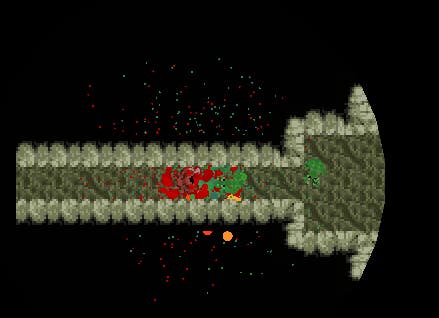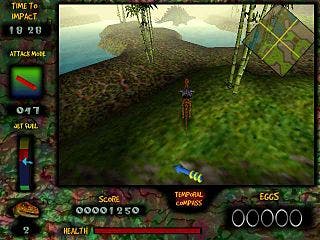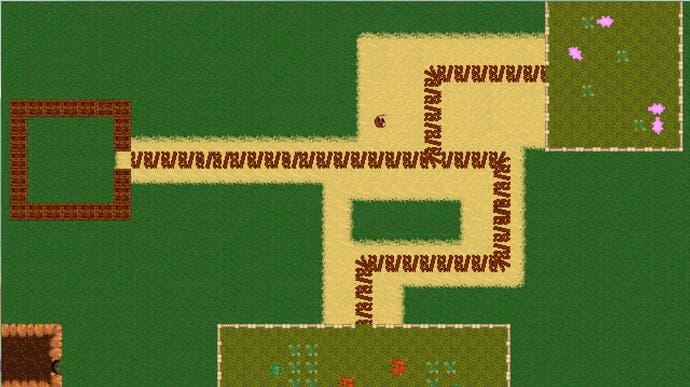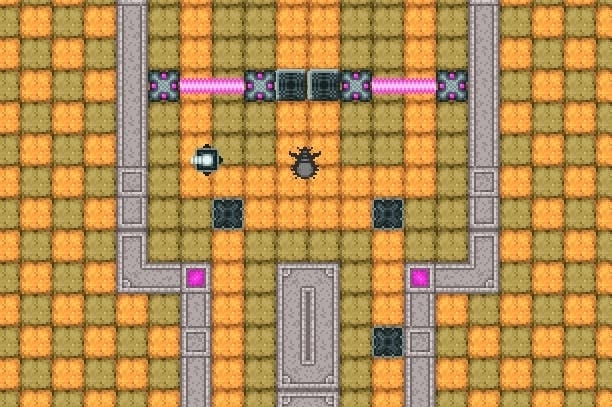Immortui: the debut game from a 15-year-old designer
"I just realised: people like working things out for themselves."
I had a hard time arranging a Skype interview with Samuel Silvester, the designer of Immortui, because I kept suggesting dates and times when he was at school. Silvester was 15 years old when he released his game in 2013, and his GCSEs were well under way. It's crazy: on top of history, business studies, music, further maths and all the rest, he still found the energy to code a bizarre first game. A bizarre first paid game, anyway. He's been tinkering with game design itself for years.
"I started just playing games on my dad's Mac when I was really young," says Silvester when I ask about his earliest gaming memories. "Really, really old games. Nanosaur I think was one of them." (Nanosaur, and this kills me, Silvester, was released in 1998.) "I always liked computers and I was always on them for a long time. Then I found GameMaker and I was just using that. I can't remember how old I was by that point. Probably about eight or something like that."
GameMaker's the same software that Derek Yu used for Spelunky. For Silvester, it led to Roblox, which he likens to a "children's version of Garry's Mod". Roblox allows its players to make basic games quickly and easily - it teaches, in effect, a simple kind of programming. For a boy like this, Roblox was a revelation.
And so Roblox led, in turn, to Ludum Dare, the increasingly influential game jam that challenges designers to make a project from scratch very quickly. "I've entered something like five, I think," says Silvester, with quiet pride. "I always get something done. None of them I'd call finished as such, but then: it's Ludum Dare."

Getting things finished was something of a problem, actually. When asked about the kinds of games that made him want to be a designer, Silvester reels off titles like Minecraft: sandboxes where he could build stuff and make puzzles for friends to solve. A certain degree of formlessness goes with the territory, and Silvester's proper debut, Immortui, suggests an approach to design that's heavily rooted in improvisation.
The thing about improvisation, though, is that it can be hard to know when to stop. "I created 150 Roblox games, and only one of them was ever marginally finished," agrees Silvester. "It's just so difficult to find the motivation to actually finish a game."
Luckily, alongside its regular themed jams, Ludum Dare also runs an October challenge. "This is where they say, take any of your old games or start a new one from scratch, finish it in a month, and earn one dollar from it," Silvester laughs. "It's just to try and motivate people like me." Immortui was Silvester's first choice, but halfway through October, he had a change of heart. "I realised I could release this game after a month, but it really wouldn't be very good. So then I decided I'd develop it for a few more months and hopefully release it after that - and hopefully make more than one dollar. Which was successful!"
The game that Silvester eventually released is extremely unusual. Immortui tasks you with rescuing 10 survivors of a zombie apocalypse, and each rescue revolves around a puzzle. You find the first survivor in a cave near the farm where the game kicks off, and the second under a nearby mountain, where you have to push TNT towards a barrier to free him. Beyond that lie more complex challenges, often involving laser grids and pressure plates, each one introducing a fresh element or nudging you towards a different kind of thinking. My favourite moment takes place in a woodland maze where the walls often come to life and try to kill you, and where you have to move flammable barrels about to spread fire across a small clearing towards your target. I think they're barrels, anyway - a large part of the early appeal of Immortui comes down to understanding what the simple graphics represent: oh, that's fire, and that's the cindered remains of something that's been burned up. That's a zombie! Shoot! Shoot!

It all makes sense to SIlvester, at least. "I like puzzle games," he says. "When I play things like Minecraft and stuff I liked the quirky aspects of it, the way that nothing really makes sense. I also realised early that I couldn't really do 3D graphics. That pushed me towards 2D and top-down sort of games, so I just made a few puzzles like that, and I thought, this kind of random-puzzle-things-coming-together could work if I just keep putting lots of them in, so you're searching around and trying to kills zombies with the puzzles. It's just a random mash of ideas."
Immortui is fascinating, frustrating, and sometimes peculiarly exhilarating to play. I'm not keen on the way you can lose track of crucial locations if you wander too far on the enormous map, but I love the fact that you can eventually solve a majority of the puzzles by just playing around with the bits and pieces. Its design seems hardy and forward-thinking: Silvester's willing to let his players follow their own whims. "That came down to the times when I used to play games with my brother on the Xbox or the Wii," he admits. "I'd be sitting down with the manual learning what every button did and how to control the game, and he'd just mash the buttons and work it out for himself. And he always beat me every single time. I just realised: people like working things out for themselves."
Silvester tells me that Immortui's full development took "absolutely ages." It then turns out that it actually took about five months. "For the kind of game it is, basically, I could only work for a few hours every weekend, and then sometimes I just stopped and worked on other things anyway." he says. "It was only the last weeks when I confirmed the release date, and I got to polishing the game, that I started to realise that polishing the game is a lot more work than I had expected.
"Essentially, I had completely underestimated how much work it was to optimise and make it run at 60 fps," he continues. "I can play Crysis 3 at 60 fps, Battlefield at 60 fps. I thought: I won't need to do anything special to make this run at 60 fps. I was wrong. It took me so long. In debug mode my game runs at 2 fps. It's just because the foundations of the game are appalling."
If that was tricky, though, the really difficult stuff was still to come. "Describing Immortui to people is a puzzle!" he laughs. "I describe it as a top-down puzzle game with zombies, and people kind of go, 'Eurgh, what's that?' I made a conscious decision to be honest. I could say, 'This is amazing, it'll blow your head off and you'll play for 10 hours.' Instead, I'll just admit - you won't. I'll just sell it as it is."
And how has the game gone down with players? "I wasn't optimistic about the sales," Silvester laughs. "I was expecting not to sell many and I haven't sold many, I've sold some copies. Let me take a look." He disappears for a few seconds and then rushes back. "I've sold 14 copies so far! I'm pleased that 14 people have played it. And people who have played it have actually liked it - and that's beyond my friends who have played it and said it's quite fun. People from the code library I use, SFML, the people from there wanted to try it and they played it and liked it. The ratings that people I don't know have given it - there are only two of them - there's a seven and a 10."

That's a foundation to build on, at least, and Silvester tells me his next move is simply to "learn more stuff." He's entering Ludum Dares again and learning to code more efficiently - in between matches of League of Legends, the only game he and his friends ever really play anymore. "Next year at some point I want to make a game that involves physics and outer space," he says. "And is a sandbox. It keeps sort of coming together in my head, but I can't picture it just yet. I think it would be nice to have something with user-based levels. Drag-and-drop stuff in an outer space level. That'd work."
That'd work. I love the pragmatism, the lack of drama or mystery, that this designer brings to his projects. It feels like a generational thing. Silvester's one of the most interesting people I've spoken to in years, but what's really fascinating is that I suspect he's not alone. I suspect that the 15-year-old game designer is not a one-off, and that, across Britain - across the world - there are thousands of other people like him, a generation that writes code, learns cheap engines, and hacks together systems with the unthinking facility that my own generation employed to draw our own comic books or write implausibly big-budget movie scripts.
Forget procedural generation, open worlds, persistent levelling perks. There's nothing so exciting about games as their ability to show us another person's perspective and to let us walk around in their imaginations for a while. Despite how wilful, weird, and occasionally abstruse Immortui is - in fact, because of all these things - I can't help wondering about the next 20 years of game development when people like this are calling the shots.
I think they're going to be amazing.

